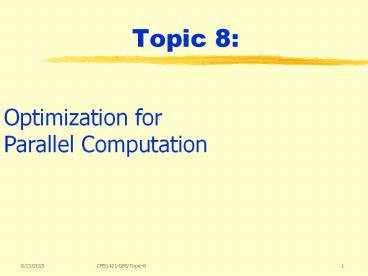Hardware/Compiler Co-Design and Compiler Optimizations - PowerPoint PPT Presentation
Title:
Hardware/Compiler Co-Design and Compiler Optimizations
Description:
Complete and flexible support of inner-loop scheduling (SWP), instruction ... Unimodular (e.g. permutation?) Loop unrolling? Both? Others ? Objective: performace ? ... – PowerPoint PPT presentation
Number of Views:26
Avg rating:3.0/5.0
Title: Hardware/Compiler Co-Design and Compiler Optimizations
1
Topic 8
Optimization for Parallel Computation
2
Reading List
- Slides Topic 8x
- Other readings as assigned in class or homework
3
Outline
- Basic Concepts
- Parallelism
- Locality
- Loop Nest Optimization
- Summary
4
Parallelism
- What is Parallelism ?
- Parallelism in Computer Architecture
- Instruction-Level Parallelism (ILP)
- Thread-Level Parallelism (TLP)
- Parallelism in Programs/Applications
- Statement Level Parallelism
- Loop Level Parallelism
- Task Level Parallelism
5
General Compiler Framework
Source
- Good IPO
- Good LNO
- Good global optimization
- Good integration of IPO/LNO/OPT
- Smooth information passing between FE and CG
- Complete and flexible support of inner-loop
scheduling (SWP), instruction scheduling and
register allocation
Inter-Procedural Optimization (IPA)
Loop Nest Optimization (LNO)
Global Optimization (OPT)
ME
Global inst scheduling
Innermost Loop scheduling
Arch Models
Reg alloc
Local inst scheduling
BE/CG
Executable
6
A Multiprocessor Architecture
- A generic modern multiprocessor
- Node processor(s), memory system, plus
communication assist - Network interface and communication controller
- Scalable network
7
Locality
- Temporal Locality
- the same data is used several times within a
short time period - Spatial Locality
- when different data elements that are located
near to each other are used within a short period
of time
8
Loop Nest Tansformation and Optimization
- Simple Loop Transformation
- Unimodular Loop Transformations
- Beyond Unimodular Transformations
- Combining Loop Transformation
- Summary
9
Simple Loop Transformation
- Loop unrolling
- Loop peeling
- ...
10
Unimodular Loop Transformation
- Loop interchange
- Loop reversal
- Loop skewing
11
Loop Interchange
Why we wish to perform loop interchange ?
12
Safety of Loop Interchange
DO J 1, M DO I 1, N A(I, J1)
A(I1, J) B ENDDO ENDDO
Is it legal to do interchange of I, J?
13
Legality of Loop Interchange
DO J 1, M DO I 1, N A(I, J1)
A(I1, J)) B ENDDO ENDDO
Note Interchange here is Illegal!
14
Loop Reversal An Example
15
Loop Reversal An Example (Contd)
Interchange
DO J M, 1, -1 DO I A(I1, J)
A(I, J1)) B ENDDO ENDDO
16
Skewing - An Example
17
Skewing - An Example
(Contd)
DO j 2, NN DO I max(1,
j-n), min(N, j-1) AI, j-1
AI-1, j-1 AI, j-I-1 END
END
18
Disadvantage of Loop Skewing
- Recompute loop bounds
- Loop bounds changes
- average vector length changes.
19
Unimodular Transformations
- Motivation
- Easy to represent compound transformations
- Elegant formulation of objective functions under
compound loop transformations
20
Beyond Unimodular Loop Trasformation
- Loop Strip-Mining
- Loop Tiling
- Loop Fusion
- Loop Fission
21
Advanced Topics Toward A Framework of
Combining Loop Transformations
22
An Example
- Assume a multi-issue architecture with resource
constraints to be considered - caches,
- registers,
- instruction scheduling
- Question What loop transformations to apply and
in what order? - Unimodular (e.g. permutation?)
- Loop unrolling?
- Both?
- Others ?
- Subroutine nest (a, b, c)
- Real8 a(1000)
- Real8 b(1000, 1000), c(1000)
- Do j 1, 1000
- DO i 1, 1000
- a(j) a(j) b(j, i) c(j)
- END DO
- END DO
- end
23
Motivating Example
Contd
- Subroutine nest (a, b, c)
- Real8 a(1000)
- Real8 b(1000, 1000), c(1000)
- Do j 1, 1000
- DO i 1, 1000
- a(j) a(j) b(j, i) c(j)
- END DO
- END DO
- end
Do i 1, 1000, 4 DO j 1, 1000
a(j) a(j) b(j, i) c(j) a(j) a(j)
b(j, i1) c(j) a(j) a(j) b(j, i2)
c(j) a(j) a(j) b(j, i3) c(j) END
DO END DO end
Question Is the above A good combination
? Loop interchange Outer loop unrolling
Inner loop fusion Why do this ? (cache effect
? of loads/stores ? Reg. Alloc ?)
24
What We Need?
- A good cost model
- A way to enumerate the space of possible loop
transformation - An intelligent way to search through the space
- Modularity of each individual transformation so
to facilitate their combination
25
It is still a problem for open research

